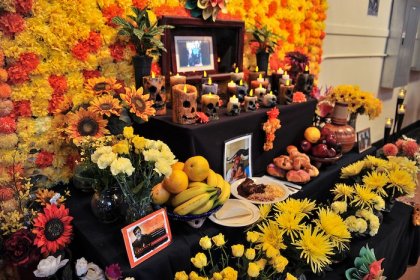Express Your Love to Those Who Are No Longer Here

When a loved one dies, the love we feel for them doesn’t. Although we now have to mourn their death, it’s also necessary to express our love to those who are no longer with us during this process.
Everyone knows there’s a personal grieving process, but there’s also a social one. It has to do with funerals, condolences, courtesy visits, etc. Currently, that process is incredibly short. People assume that in a few days you must be ready to go back to your “normal” life and that you have to do everything you can to forget. You have to try to set aside that difficult experience you’re living because long or very intense grieving bothers other people.
“And when my voice is silent in death, my song will speak in your living heart.”
-Rabindranath Tagore-
Sometimes you manage to adapt to those social mandates and, in a short time, you resume your daily routine. You may feel like crying after seeing a beautiful sunset, but you hold back. It can also happen that something inside you is reluctant to say goodbye and it starts being really difficult to live with yourself and others. It’s possible that in both cases we need to express our love to those who are no longer with us.
Honor those who are no longer here
Strictly speaking, none of the people we have loved die. A part of them always lives inside us, even if we’re not aware of it. Each of us is inhabited by these presences, even though they’re perceived as absences. Our love doesn’t die either.

This is why, in all cultures, there’s always been a set of traditions to honor people who died. In the West, it was customary to visit their graves, bring them flowers, and pray. People don’t really do this anymore. Cemeteries aren’t a place where people want to be. In reality, we’ve run out of ways to express our love to our loved ones who have passed away.
Certainly, the things we do to honor the dead aren’t just conventional. They’re ways of expressing our love to those who are no longer here. It seems like it would be much more accurate to say that these things are rituals that help us come to terms with their absence. They help us remember them, although it may hurt.
Express your love to those who are no longer here
Staying stuck inside our pain is as harmful as turning a blind eye to it. Those who are no longer here, especially if we loved them deeply or if they played a decisive role in our lives, are still here with us.
They come back to us when we feel lonely and also when we grieve. They come back suddenly, in the shape of a sadness that doesn’t go away or of a feeling of helplessness that turns into vertigo. For that reason, all ancestral cultures honored those who passed away. They knew that it was very important to express their love for them.

Although it’s said that human beings are fundamentally present, and this is largely true, it may be more accurate to say that we’re, above all, past. We’re a story that continues to be told, day after day. This is why it’s important to not forget those who came before us.
How to express your love to those who are no longer here
One of the most beautiful traditions in the world is the Day of the Dead in Mexico. It’s a celebration that’s halfway between a ritual and a carnival. Every November 1st, people remember their loved ones who have passed away. Their photographs are exhibited and they become protagonists in the world of the living again.
Mexicans write letters to them, set up altars, and pray for them. They also go to the cemeteries and sing to their loved ones. They make these ghosts visible and talk to them. And they honor them by declaring that forgetting them is impossible.

We should all have our own rituals to honor those who passed away and express our love for them. This way, we can come to terms with the fact that we still have an affectional bond with them which not even death can break.
When a loved one dies, the love we feel for them doesn’t. Although we now have to mourn their death, it’s also necessary to express our love to those who are no longer with us during this process.
Everyone knows there’s a personal grieving process, but there’s also a social one. It has to do with funerals, condolences, courtesy visits, etc. Currently, that process is incredibly short. People assume that in a few days you must be ready to go back to your “normal” life and that you have to do everything you can to forget. You have to try to set aside that difficult experience you’re living because long or very intense grieving bothers other people.
“And when my voice is silent in death, my song will speak in your living heart.”
-Rabindranath Tagore-
Sometimes you manage to adapt to those social mandates and, in a short time, you resume your daily routine. You may feel like crying after seeing a beautiful sunset, but you hold back. It can also happen that something inside you is reluctant to say goodbye and it starts being really difficult to live with yourself and others. It’s possible that in both cases we need to express our love to those who are no longer with us.
Honor those who are no longer here
Strictly speaking, none of the people we have loved die. A part of them always lives inside us, even if we’re not aware of it. Each of us is inhabited by these presences, even though they’re perceived as absences. Our love doesn’t die either.

This is why, in all cultures, there’s always been a set of traditions to honor people who died. In the West, it was customary to visit their graves, bring them flowers, and pray. People don’t really do this anymore. Cemeteries aren’t a place where people want to be. In reality, we’ve run out of ways to express our love to our loved ones who have passed away.
Certainly, the things we do to honor the dead aren’t just conventional. They’re ways of expressing our love to those who are no longer here. It seems like it would be much more accurate to say that these things are rituals that help us come to terms with their absence. They help us remember them, although it may hurt.
Express your love to those who are no longer here
Staying stuck inside our pain is as harmful as turning a blind eye to it. Those who are no longer here, especially if we loved them deeply or if they played a decisive role in our lives, are still here with us.
They come back to us when we feel lonely and also when we grieve. They come back suddenly, in the shape of a sadness that doesn’t go away or of a feeling of helplessness that turns into vertigo. For that reason, all ancestral cultures honored those who passed away. They knew that it was very important to express their love for them.

Although it’s said that human beings are fundamentally present, and this is largely true, it may be more accurate to say that we’re, above all, past. We’re a story that continues to be told, day after day. This is why it’s important to not forget those who came before us.
How to express your love to those who are no longer here
One of the most beautiful traditions in the world is the Day of the Dead in Mexico. It’s a celebration that’s halfway between a ritual and a carnival. Every November 1st, people remember their loved ones who have passed away. Their photographs are exhibited and they become protagonists in the world of the living again.
Mexicans write letters to them, set up altars, and pray for them. They also go to the cemeteries and sing to their loved ones. They make these ghosts visible and talk to them. And they honor them by declaring that forgetting them is impossible.

We should all have our own rituals to honor those who passed away and express our love for them. This way, we can come to terms with the fact that we still have an affectional bond with them which not even death can break.
This text is provided for informational purposes only and does not replace consultation with a professional. If in doubt, consult your specialist.







